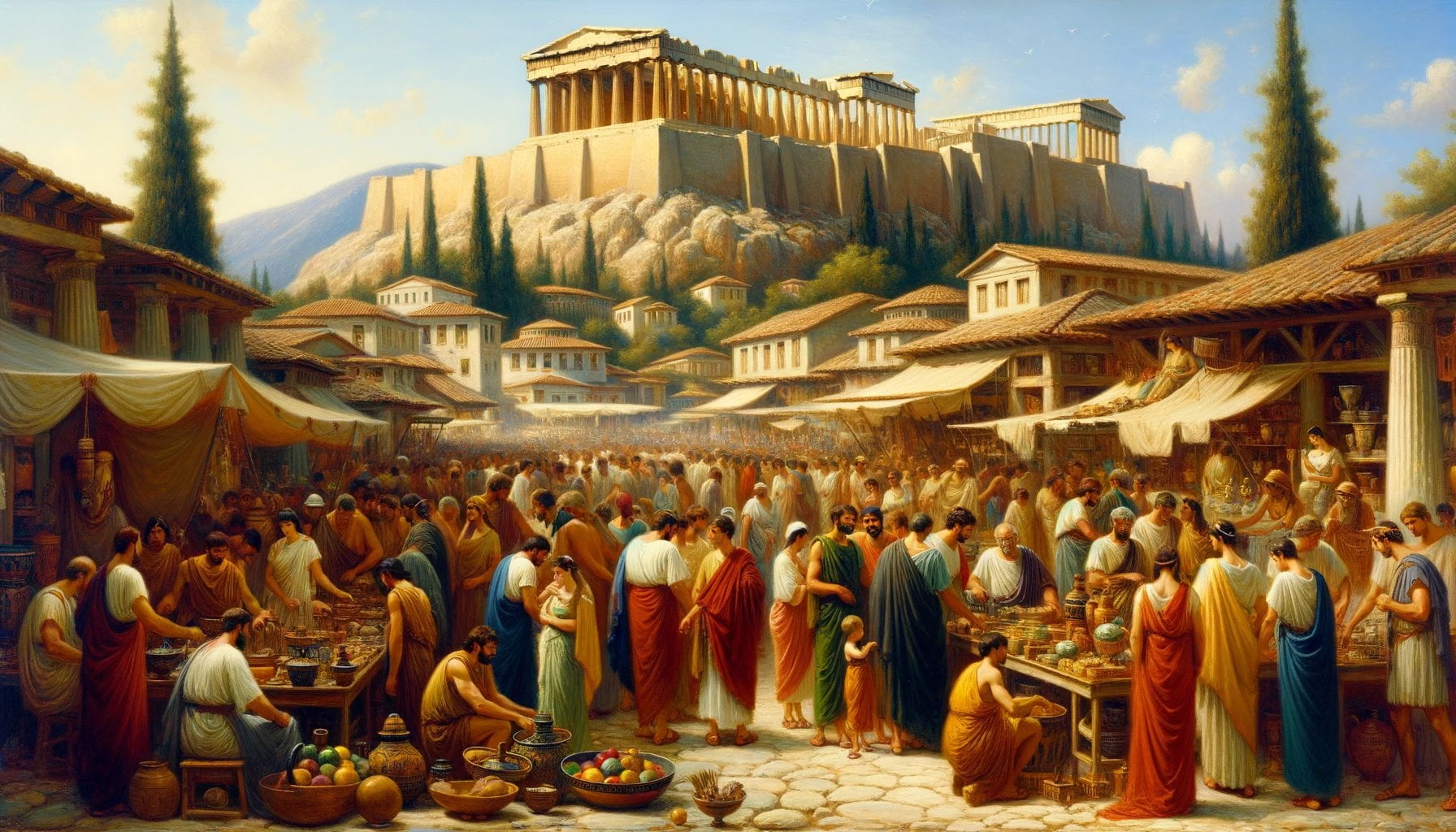Step back in time and immerse yourself in the captivating world of ancient Greek punishment as we embark on a journey of discovery through the eyes of a seasoned historian. Delving deep into the annals of history, this insightful article sheds light on the fascinating penal practices that shaped the social fabric of ancient Greek society. Drawing on meticulous research and a rich understanding of the era, our expert historian unveils the hidden stories behind the various forms of punishment and their profound cultural significance. Brace yourself for a riveting exploration of justice in the ancient Greek world, where retribution and redemption intertwined in the pursuit of a collective moral order.
Key Takeaways:
- Exile and Ostracism: Ancient Greeks used exile for homicide cases and ostracism for political crimes, forcing individuals to leave their city-state and live elsewhere.
- Fines: Offenders could be fined for various offenses, such as rape, with the amount depending on the severity of the crime.
- Imprisonment and Public Humiliation: Imprisonment and public humiliation, like being placed in stocks, were used as forms of punishment in Ancient Greece.
- Loss of Political Rights and Disfranchisement: Offenders could be stripped of their political rights and prevented from participating in the political affairs of their city-state.
- Confiscation of Property and Razing of House: Offenders could have their property confiscated, and their house could be destroyed, leaving them without possessions or a place to live.
- Death Penalty: The death penalty was imposed for serious offenses like intentional homicide, with one method of execution involving throwing the culprit into a pit or ravine.
- Punishments varied across city-states and time periods in Ancient Greece, with Athenians employing fines, imprisonment, public humiliation, disfranchisement, exile, and death as punishment methods.
- Punishment severity depended on the gravity of the crime committed and could be influenced by social, political, and cultural factors.
Ancient Greek Punishment

Ancient Greek society was known for its complex systems of justice and punishment. In this article, we will delve into the fascinating world of ancient Greek punishment, exploring the various methods used to maintain order and ensure justice in society.
Exile and Ostracism
Exile was a common form of punishment in ancient Greece, particularly for homicide. Offenders were banished from their city-state and forced to live in a distant location, away from their families and communities. This isolation served as a deterrent and also protected the city-state from potential harm.
Similarly, ostracism was employed for political crimes. Individuals deemed a threat to the city-state’s stability were exiled for a period of ten years. This practice aimed to prevent the rise of tyrants and maintain a democratic system.
Fines
Fines were another prevalent form of punishment in ancient Greece. Offenders would be required to pay a sum of money as a penalty for their actions. The amount of the fine depended on the severity of the crime committed.
For instance, committing rape could result in a fine of 100 drachmas. This monetary punishment aimed to deter individuals from engaging in unlawful behavior and provided a means of compensation for the victim.
Imprisonment and Public Humiliation
Imprisonment was occasionally used as a form of punishment in ancient Greece. Offenders would be confined to a prison, depriving them of their freedom. However, it is important to note that this method was not as prevalent as exile or fines.
In certain cases, offenders could also be subjected to public humiliation. They would be placed in stocks, where they would be exposed to ridicule and scorn from the community. This public shaming served as a deterrent and reinforced societal norms.
Loss of Political Rights and Disfranchisement
In ancient Greece, offenders could face the loss of their political rights and be disfranchised. This meant that they would no longer have the right to participate in the political affairs of their city-state. This punishment was particularly significant in a society that highly valued political participation.
Confiscation of Property and Razing of House
For serious offenses, offenders could have their property confiscated. In some cases, their house could even be razed, leaving them homeless and without any possessions. This harsh measure aimed to ensure that the punishment was commensurate with the severity of the crime committed.
Death Penalty
The death penalty was the most severe punishment in ancient Greece and could be imposed in various ways. One particularly brutal form of execution was known as Baratheon Rhaphanidosis. In this method, the culprit was thrown into a pit or ravine, resulting in their demise.
However, it is important to recognize that the death penalty was not applied uniformly in ancient Greece. Its use varied across city-states and time periods, and it was typically reserved for the most egregious offenses, such as intentional homicide.
Conclusion
Throughout ancient Greek history, punishment methods varied depending on the city-state and time period. Athenians, for example, implemented fines, imprisonment, public humiliation, disfranchisement, exile, and, in some cases, the death penalty. These punishments were influenced by social, political, and cultural factors and aimed to ensure justice and maintain order in society.
By exploring the intricacies of ancient Greek punishment, we gain valuable insights into their systems of justice and the cultural context in which they operated. Ancient Greek punishment serves as a reminder of the importance placed on maintaining a harmonious and orderly society.
In ancient Greece, queens held significant power and influence. Discover more about these remarkable ancient Greek queens by clicking on the link: ancient greek queens.
Unveil the mysteries of the ancient Greek world with the wisdom of the prophetess. Click here to explore more about the fascinating role of ancient Greek prophetesses: ancient greek prophetess.
Step back in time and explore the remarkable transportation methods used in ancient Greece. Click on the link to learn more about the fascinating world of ancient Greek transportation: greek transportation ancient.
Explore the weapons of the ancient Greeks and delve into the intriguing world of ancient Greek warfare. Click here to find out more about ancient Greek daggers: ancient greek daggers.
Social and Political Implications of Punishment
In the world of ancient Greece, punishment held significant social and political implications. Punishments weren’t just about meting out justice; they also played a crucial role in shaping social identities and maintaining order within the society. As a historian specializing in ancient civilizations and their systems of justice, I have unraveled the complexities of ancient Greek punishment and the impact it had on the community.
The Power of Punishment: Maintaining Social Order
Punishment in ancient Greece served as a means to maintain social order and deter individuals from engaging in unlawful activities. By enforcing penalties, the society sought to create a sense of fear and deterrence among its members. Laws were recorded in writing to ensure justice and fairness in punishment. This legal framework helped establish a system wherein both citizens and foreigners were subject to the same punishments, ensuring equality before the law.
One of the most severe forms of punishment was the death penalty, but it was only reserved for serious offenders. However, it was employed as a last resort after other forms of penalties had been exhausted. The death penalty aimed not only to punish the wrongdoer but also to serve as a cautionary tale for others who might consider breaking the law.
Punishment as Social Stigma
Punishment in ancient Greece went beyond physical penalties; it also had a powerful expressive function. It served as a means to express societal disapproval and reinforce social norms. The stigma associated with certain forms of punishment influenced how individuals were perceived within the community and impacted their social standing.
For instance, fines were a common form of punishment and varied depending on the severity of the crime committed. Apart from the financial burden, paying a fine could also lead to a loss of social status. The punishment not only affected the offender’s reputation but also served as a reminder to others of the consequences of deviating from societal norms.
Status and Punishment: Slaves and Citizens
In ancient Greece, the social and political implications of punishment extended to different segments of the population. Slaves breaking the law faced dire consequences, often resulting in execution, and their masters would be fined. This approach aimed to maintain control over the slave population while holding their masters accountable for their actions.
Citizens, on the other hand, could face a range of punishments depending on the severity of their offenses. These penalties included fines, imprisonment, public humiliation, and, in extreme cases, the death penalty. The type of punishment received could influence an individual’s standing within the community and their ability to participate in political life.
Lessons from the Past
Studying ancient Greek punishment provides valuable insights into the social and political dynamics of that time. By examining the interplay between punishment, stigma, and social identities, we can gain a deeper understanding of the values and norms that shaped ancient Greek society. This exploration also offers parallels to modern debates on punishment and its impact on social structures.
As a historian passionate about sharing my knowledge and expertise, I find it fascinating to delve into the ancient Greek world of punishment. Through meticulous research and analysis, I aim to shed light on not only the practices themselves but also the broader social and political implications they held.
Key Takeaways:
- Ancient Greek punishment served the dual purpose of maintaining social order and shaping social identities.
- The death penalty was employed sparingly and as a last resort after other forms of penalties had been exhausted.
- Punishment went beyond physical penalties; it also carried an expressive function, reinforcing social norms and stigmatizing offenders.
- Slaves breaking the law would face execution, with their masters being fined as well.
- Punishments influenced an individual’s standing within the community and their political rights.
- Studying ancient Greek punishment provides insights into the values and norms that shaped the society and offers parallels to modern debates on punishment.
Famous Cases of Punishment in Ancient Greece
Throughout ancient Greek society, punishment served as a means to maintain order, deliver justice, and shape social identities. There were numerous cases of punishment that left lasting impressions on the culture and history of Greece. As an accomplished historian specializing in ancient civilizations and their systems of justice, I have delved into these intriguing cases to provide you with unique insights and captivating stories from the ancient Greek world.
Key Takeaways:
– Punishment in ancient Greece aimed to ensure justice and uphold societal norms.
– The death penalty was the most severe punishment and varied in its methods and usage.
– Physical and expressive punishments were used, stigmatizing offenders and reinforcing social norms.
– Punishments could impact an individual’s social standing and participation in political life.
1. The Trial and Execution of Socrates
One of the most famous cases of punishment in ancient Greece is the trial and execution of the renowned philosopher Socrates. Accused of corrupting the youth and questioning the gods of Athens, Socrates faced charges of impiety and introducing new deities. In 399 BCE, he was put on trial, convicted, and given the option to propose an alternative punishment. However, Socrates, known for his unwavering commitment to truth, refused and accepted the death penalty. He drank a cup of poison hemlock, willingly sacrificing his life for his principles.
2. Prometheus’ Torturous Punishment
Greek mythology offers us another notable case of punishment: the torment of Prometheus. In an attempt to bring fire and knowledge to humanity, Prometheus crossed Zeus, the king of gods. As retribution, Zeus chained Prometheus to a rock in the Caucasus Mountains, where a vulture would feast on his liver every day. This excruciating punishment served as a reminder of the consequences of defying the divine order.
3. The Fate of Tantalus
Tantalus, a figure from Greek mythology, suffered a unique and eternal punishment. As a mortal who dared to steal ambrosia from the gods and reveal their secrets, Tantalus was condemned to stand in a pool of water, surrounded by fruit-laden trees. However, whenever he reached for the fruit or bent down to drink the water, they would retreat, forever out of his reach. This punishment became synonymous with eternal frustration and unattainable desires.
4. The Curse of Sisyphus
Sisyphus, known for his craftiness and deceitfulness, received a fitting punishment for his actions. According to legend, Sisyphus was condemned by Zeus to endlessly roll a boulder up a hill, only to watch it roll back down before reaching the top. This eternal task symbolized the futility of Sisyphus’ actions and served as a warning against rebellion and treachery.
5. The Tale of Midas’ Golden Touch
King Midas, known for his greed and desire for wealth, received a unique punishment that showcased the consequences of his actions. As a result of a wish granted by the god Dionysus, everything King Midas touched turned to gold. While initially thrilled by his newfound power, he soon realized the curse it brought upon him. His food turned into inedible gold, and even his daughter transformed into a golden statue. This punishment served as a cautionary tale, demonstrating the dangers of unchecked avarice and the true cost of material wealth.
These famous cases of punishment in ancient Greece offer us a glimpse into the values, beliefs, and social order of the time. From the persecution of great philosophers to the mythical curses bestowed on devious characters, these stories continue to captivate and resonate with us. By understanding the history and cultural significance of ancient Greek punishment, we can gain valuable insights into the human condition and our own societal debates on justice and retribution.
Sources:
– Mintage World
Comparisons to Modern Justice Systems
Justice systems have evolved significantly over time, and exploring the ancient Greek approach to punishment can shed light on the similarities and differences between their system and our modern systems. While ancient Greek punishment aimed to ensure justice and maintain social order, there are several key distinctions to consider when comparing it to modern justice systems.
Retribution vs. Rehabilitation
In ancient Greece, punishment was primarily focused on retribution and deterrence, aiming to restore balance and satisfy the need for justice. Offenders faced physical and expressive punishments that stigmatized them and reinforced social norms. The emphasis was on punishing the individual rather than rehabilitating them or addressing the root causes of their behavior.
In contrast, modern justice systems strive for a balance between retribution and rehabilitation. While punishment is still an important aspect, there is a growing recognition of the need to address the underlying factors that contribute to criminal behavior. Rehabilitation programs and restorative justice initiatives are implemented to help offenders reintegrate into society and prevent further crimes.
Purpose of Punishment
Ancient Greek punishment served multiple purposes, including maintaining social order, shaping social identities, and instilling fear and deterrence among its members. It aimed to uphold societal norms and reinforce the hierarchy and values of the community. The severity of punishments varied depending on the offense, with the death penalty being the most severe.
In modern justice systems, the purpose of punishment extends beyond societal order to include concepts like deterrence, rehabilitation, and protection of the public. Punishments are designed not only to hold offenders accountable for their actions but also to prevent future crimes and protect the rights and safety of individuals.
Justice and Equality
Ancient Greece had a complex relationship between justice and equality. While democracy, justice, and equality were central concerns in ancient Greek political thought, the application of justice was often influenced by social hierarchies and power dynamics. Punishments could vary depending on an individual’s social standing and their ability to participate in political life.
Modern justice systems strive for equal treatment under the law, regardless of an individual’s social standing. The principles of fairness and equality are fundamental to the functioning of modern legal systems. The concept of justice is closely intertwined with the idea that everyone should be treated impartially and have equal access to justice and due process.
Evidence-Based Trials vs. Rhetorical Arguments
In ancient Greece, the judicial system relied heavily on rhetorical arguments rather than concrete evidence. Trials were often determined by the persuasive abilities of the lawyers and the emotional appeals made to the judges. This emphasis on rhetoric allowed for potential biases and subjective interpretations of the facts.
In contrast, modern justice systems prioritize evidence-based trials, where facts, testimonies, and physical evidence play a crucial role in determining the outcome. The goal is to ensure fairness and objectivity in the assessment of guilt or innocence. Although rhetoric still plays a role in legal proceedings, it is supplemented by the presentation of verifiable evidence.
Conclusion
While ancient Greek punishment and modern justice systems share the common goal of maintaining order and upholding societal values, there are significant differences in their approaches. Ancient Greek punishment focused more on retribution and the punishment of the individual, while modern systems aim for a balance between retribution, rehabilitation, and the protection of society.
Key Takeaways:
– Ancient Greek punishment focused on retribution and deterrence, while modern justice systems strive for a balance between retribution and rehabilitation.
– Ancient Greek punishment aimed to maintain social order and reinforce social norms, while modern systems aim to prevent future crimes and protect the public.
– Ancient Greek justice was influenced by social hierarchies, while modern justice systems prioritize equality and fairness.
– Ancient Greek trials relied on rhetorical arguments, whereas modern systems prioritize evidence-based trials.
– Comparing ancient Greek punishment to modern justice systems provides insights into the evolution and values of justice throughout history.
References:
– Western University. “Crime and Punishment in Ancient Greece and Rome.”
– NDPR. “Democracy, Justice, and Equality in Ancient Greece: Historical and.

FAQ
Q1: What were some common forms of punishment in ancient Greece?
A1: Some common forms of punishment in ancient Greece included exile, fines, imprisonment, public humiliation, loss of political rights, confiscation of property, and the death penalty.
Q2: What crimes were punishable by exile in ancient Greece?
A2: Exile was commonly used as a punishment for homicide in ancient Greece. It involved banishing the individual from their city-state and forcing them to live in a distant location away from their family and community.
Q3: How were fines used as a form of punishment in ancient Greece?
A3: Fines were imposed for various offenses in ancient Greece, such as rape and other crimes. For example, committing rape could result in a fine of 100 drachmas.
Q4: What was the role of public humiliation in ancient Greek punishment?
A4: Public humiliation was sometimes used as a form of punishment in ancient Greece. Offenders could be placed in stocks, where they would be exposed to ridicule and scorn from the community.
Q5: What were some severe punishments in ancient Greek society?
A5: In ancient Greece, severe punishments included the loss of political rights and disfranchisement, confiscation of property, destruction of the offender’s house, and the death penalty, which could be imposed in various ways, such as throwing the culprit into a pit or ravine.
















